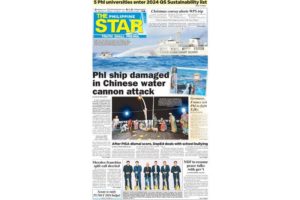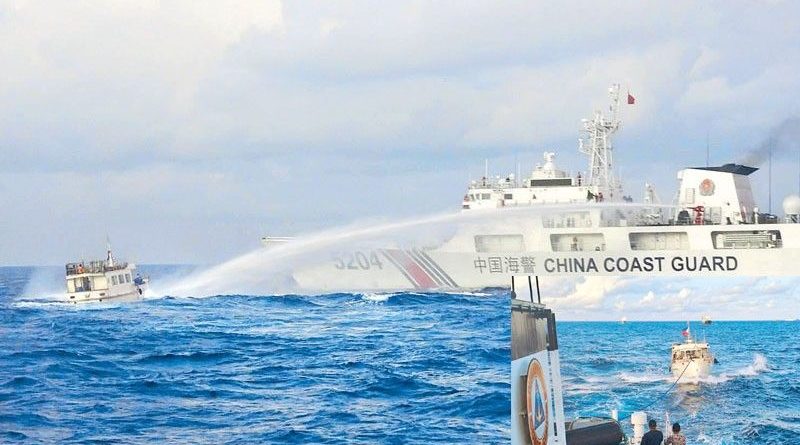HEADLINE-ASIA GEOPOLITICS | Philippine ship damaged in Chinese water cannon attack
Image from video handout provided by the Philippine Coast Guard shows a Chinese Coast Guard ship blasting one of three Filipino resupply vessels with water cannon in Ayungin Shoal yesterday. Inset shows M/L Kalayaan, the damaged resupply vessel, being towed by BRP Sindangan after the incident.

MANILA, Philippines — A boat commissioned to bring supplies to troops manning a grounded vessel at Ayungin Shoal in the West Philippine Sea (WPS) suffered serious engine damage after it was blasted with a water cannon by the China Coast Guard (CCG).
Commodore Jay Tarriela, Philippine Coast Guard (PCG)-WPS spokesperson, confirmed on X that a regular routine resupply and rotation or RORE mission to the BRP Sierra Madre in Ayungin was conducted yesterday morning.
“BRP Cabra, Unaizah Mae 1 (UM1) and M/L Kalayaan water cannoned by China Coast Guard. M/L Kalayaan suffered serious engine damage. Contrary to China Coast Guard disinformation, UM1 rammed by CCG vessel,” Tarriela said.
The National Task Force-WPS (NTF-WPS), of which the PCG is one of the member-agencies, said in a statement that while the two supply boats M/L Kalayaan and UM1 – escorted by the PCG’s BRP Cabra and BRP Sindangan – were traversing the WPS, they were reportedly harassed and blocked by the CCG and Chinese maritime militia (CMM) vessels.
The NTF-WPS said that the CCG and CMM ships also executed dangerous maneuvers on the two civilian supply vessels from the Philippines, and seriously placed the lives of the Filipino crew in danger.
“CCG vessel 5204 deployed a water cannon against the Philippine supply vessels causing severe damage to M/L Kalayaan’s engines, disabling the vessel and seriously endangering the lives of its crew,” the NTF-WPS said.
As of press time, the Sindangan was reported to be safely towing the disabled Kalayaan back to Ulugan Bay in Palawan.
The task force also reported that the mast of the PCG’s other vessel Cabra was also damaged after it was allegedly directly targeted by the full strength of the CCG vessel’s water cannon.
It added that the “PCG vessels and the resupply boats UM1 and M/L Kalayaan were subjected to reckless and dangerous harassment at close range by CCG and Chinese Maritime Militia vessels on their approach to Ayungin Shoal.”
The NTF-WPS said Beijing performed “extreme and reckless actions” when its CCG 21556 vessel reportedly rammed UM1.
But despite these attempts to thwart the RORE, UM1 was able to successfully reach BRP Sierra Madre and is currently unloading supplies for the military personnel stationed there.
“We condemn, once again, China’s latest unprovoked acts of coercion and dangerous maneuvers against a legitimate and routine Philippine rotation and resupply mission to Ayungin Shoal that has put the lives of our people at risk,” the NTF-WPS said.
“The systematic and consistent manner in which the People’s Republic of China carries out these illegal and irresponsible actions puts into question and significant doubt the sincerity of its calls for peaceful dialogue. Peace and stability cannot be achieved without due regard for the legitimate, well-established, and legally settled rights of others,” it added.
It also expressed “grave concern” over the reported deliberate disinformation to distort the facts, conducted via official channels.
In a statement, the CCG said it had “implemented controls in accordance with laws and regulations” during yesterday’s incident.
The statement gave no details about the measures taken, but said the Philippines’ action “seriously infringed on China’s sovereignty.”
It also claimed that UM1 ignored warnings, and in violation of international navigation regulations, made a sharp turn in an “unprofessional and dangerous manner” and intentionally collided with a CCG ship, causing “scratching.”
“The responsibility lies entirely with the Philippine side,” the CCG said.
Drone video footage and photographs issued by the PCG show two CCG ships separately blasting water cannons at close range at BRP Cabra and a smaller supply boat.
Exercising sovereign rights
The NTF-WPS reiterated that Ayungin Shoal is a low-tide elevation within the Philippine’s exclusive economic zone (EEZ) and continental shelf, in accordance with the United Nations Convention on the Law of the Sea (UNCLOS) and as upheld by the 2016 Arbitral Award.
“The Philippines exercises sovereign rights and jurisdiction over the feature. As a low tide elevation, Ayungin Shoal can neither be the subject of a sovereignty claim nor is it capable of appropriation under international law,” it said.
The task force added that “China cannot lawfully exercise sovereignty over it. In this regard, the assertion of China that its actions in the vicinity of Ayungin Shoal are a legitimate exercise of law enforcement measures, has no basis in international law.”
“We demand that China demonstrate that it is a responsible and trustworthy member of the international community. The Philippines continues to act in accordance with international law, particularly UNCLOS and the 2016 Arbitral Award. The Philippines will not be deterred from exercising our legal rights over our maritime zones, including Ayungin Shoal which forms part of our EEZ and continental shelf,” the NTF-WPS added.
The maritime incidents, which have grown increasingly heated this year, have stoked fears of an armed conflict that could involve the US, which has vowed to defend the Philippines, its treaty ally, if Filipino forces come under an armed attack.
This was the second day in a row that the CCG fired water cannons at Philippine vessels, following an incident on Saturday where the latter blocked a humanitarian mission from the Bureau of Fisheries and Aquatic Resources to Filipino fisherfolk at Scarborough Shoal.
‘Fight for these waters’
In a post on X referring to Saturday’s water cannon incident with the CCG, Tarriela yesterday asked Filipinos to “fight for these waters.”
The PCG-WPS spokesperson said that the Filipino people should fight for their territorial right over the waters of Bajo de Masinloc, also known as Panatag Shoal and Scarborough Shoal.
Bajo de Masinloc is a known rich fishing ground that used to be frequented by Filipino fishermen before the Chinese vessels started guarding and barricading the entry to the shoal in 2012.
Tarriela stressed the importance for Filipinos to denounce these actions of China. “It is crucial for all Filipino people and our entire nation to strongly condemn such actions.
“Whatever China is fighting for to illegally occupy these waters, the Filipinos need to fight for these waters because our life depends on it,” he said. — Rainier Allan Ronda


 Memento Maxima Digital Marketing
Memento Maxima Digital Marketing







